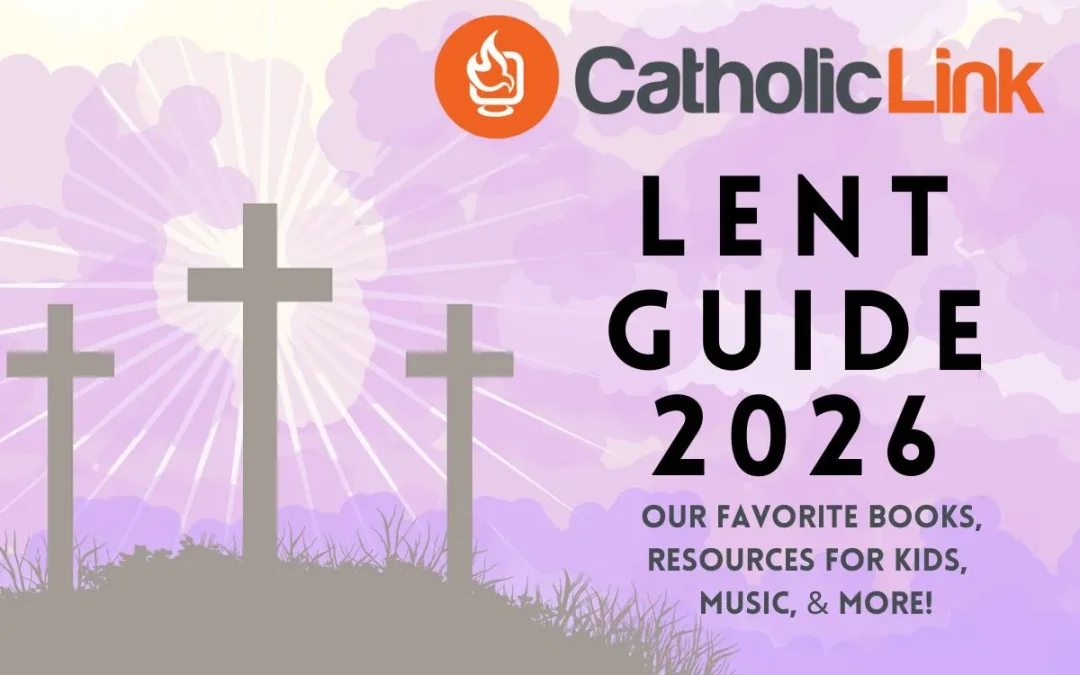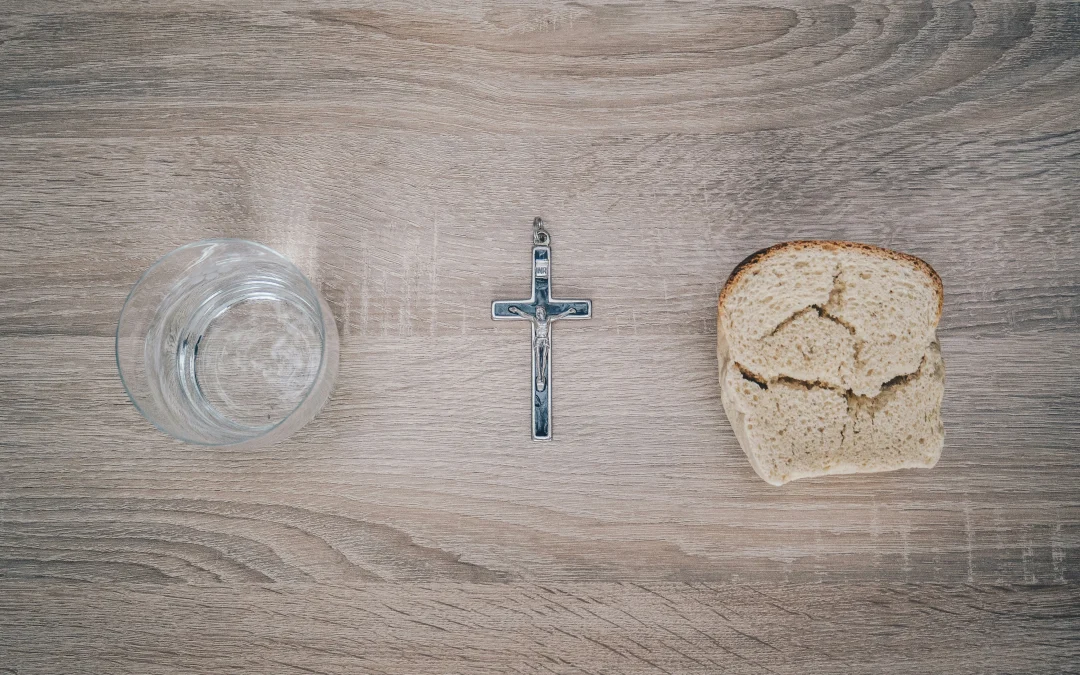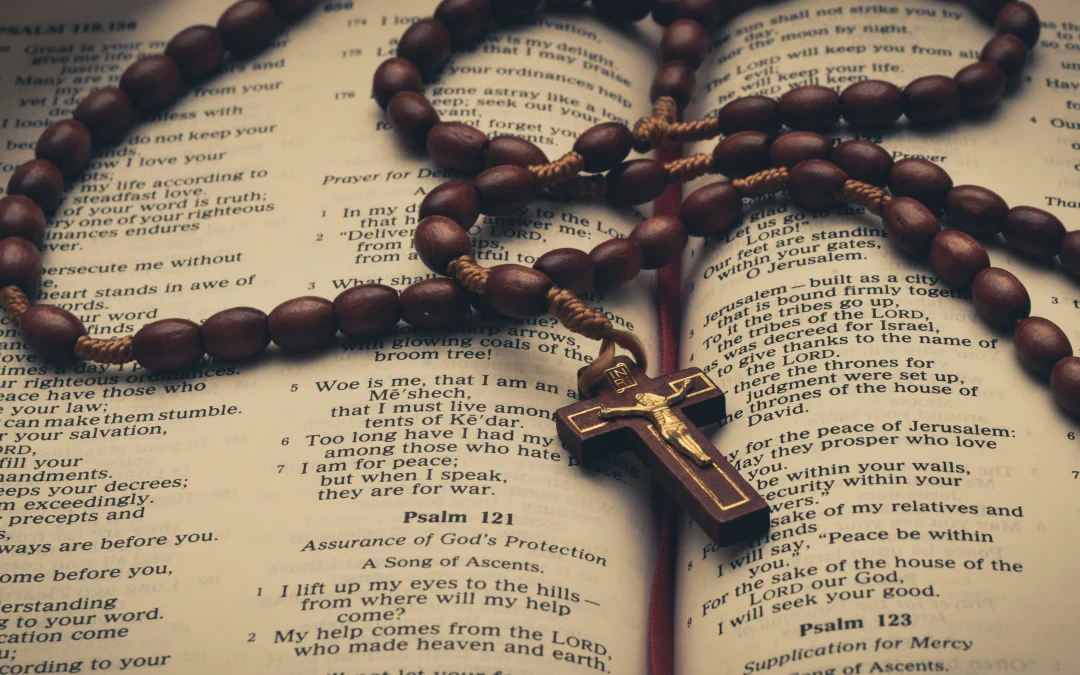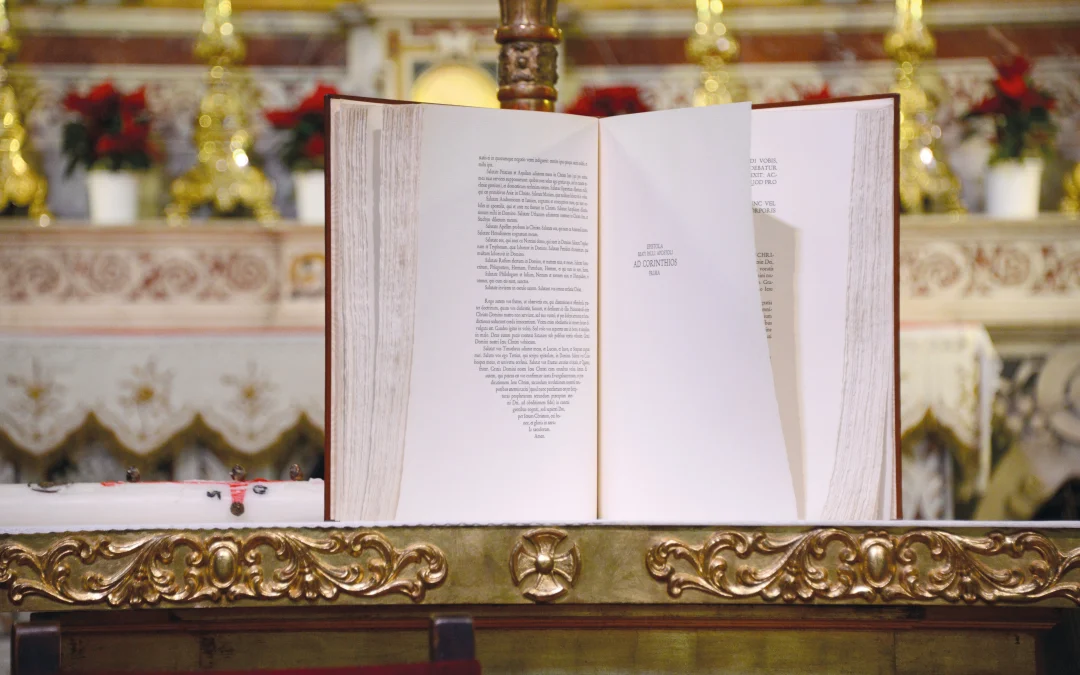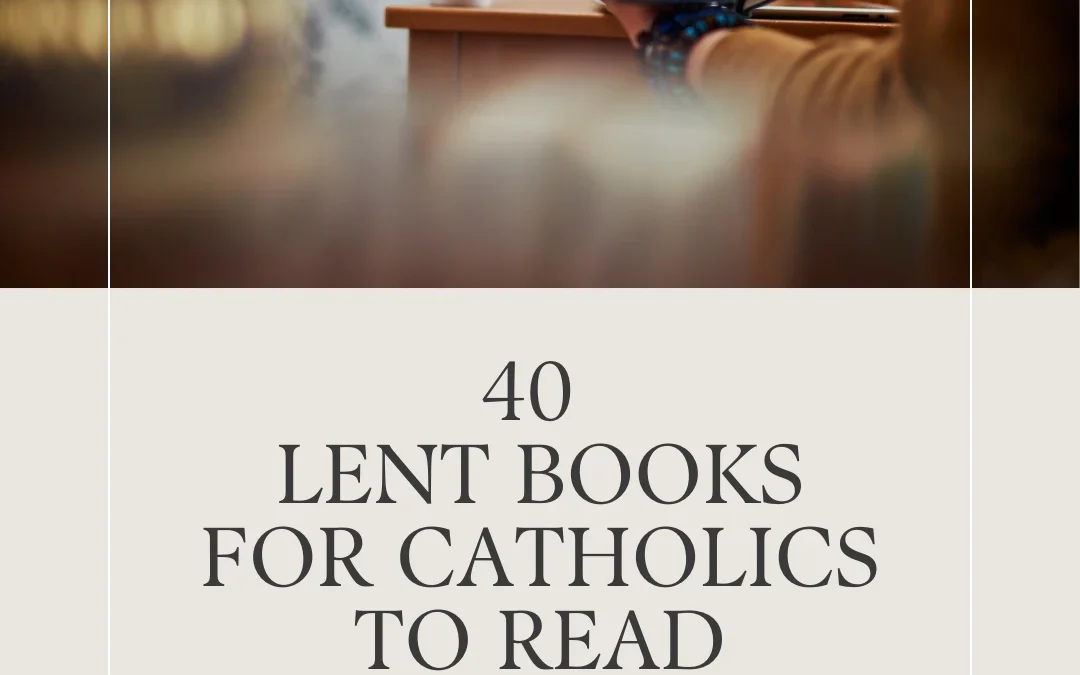The Our Father is our foundational prayer as Catholics. If you’re like me, you’ve said it a few times. As in, a few thousand times. Tens of thousands if you pray the Rosary or Divine Office regularly. It’s easy for something so familiar to become muscle memory and to forget what we’re doing in the first place. Let’s take a quick trip back through the Our Father.
The Our Father consists of seven petitions or requests that we ask of God the Father in heaven. To help you reconnect with the prayer more deeply, we’ll examine each petition individually and provide some questions to prompt you to engage with it a little bit more.
Our Father, who art in Heaven…The 7 Petitions Of The Or Father
1. Hallowed Be Thy Name
Have you ever thought about what this means? To “hallow” is to make holy. Great. What does that mean? Well, “holy” means set apart, or of God. So, to hallow the Father’s Name means to set it apart, to make it of God. This is closely related to the Second Commandment, “Thou shalt not take the name of the Lord your God in vain” (Ex 20). The Father’s Name should be about God, about setting Him apart from all the other things we say (i.e., not be about how frustrated or surprised I am).
Some questions to consider as you pray:
- Children receive the last name of their parents. Baptized as children of the Father, we in a way receive the Father’s name. What does it mean to share the Father’s name?
- How do you speak about the things most special to you? Do you speak of the Father that way?
- The Jewish people hold God’s name revealed in the book of Exodus 3:14 so sacred that they refuse to say it out loud. In this prayer, we name Him Father. God has many other names in Scripture as well. What names of God do you know?
2. Thy Kingdom Come
Government is often almost seen as a dirty word in America today. Yet, Jesus speaks of a kingdom when He teaches us to pray. A kingdom means that there is a king who rules and people who are ruled. We are praying that His rule would be welcomed and lived more fully.
- You are a part of many “kingdoms,” groups that you identify with and belong to and whose rules, explicit or otherwise, you follow. You are part of a nation. What makes you a part of these groups? What do you like about belonging to them? Taking belonging with those groups as a backdrop, what does it mean to be a member of the Kingdom of God?
- Is there a part of your life that you particularly strive to control, to be king of? What would it look like if the Father became king of it? What obstacles are there to giving God the sovereignty of that part of your life?
- Christ teaches us what the Kingdom of the Father is like in the Gospels. How can you make the things around you a bit more like the Father’s Kingdom?
A personal example: As the sole financial provider for my family of 7, I quite frequently strive to be the “king” of my finances. I have career goals, and I have contingency plans, and I want to be in control. The idea of even asking God what he wants for my career is honestly often alarming. This shows me that I have, on some level, a mistrust of God, as if He would care for my family less if I asked and then did what He said. So when I pray this line of the Our Father, I often think of my finances and ask the Father to help me let Him into that space.
3. Thy Will Be Done on Earth as It Is in Heaven
The first three petitions of the Our Father are different aspects of the theme of bringing Earth and Heaven together, perfectly modeled in Christ.
- Have you ever thought of Heaven in terms of obedience to the Father? What do you think it might be like?
- What do you think the Father wants for you?
- Is there an area of your life that you’ve never asked about the Father’s will for?
A personal example: I have sometimes thought of Heaven as a perfectly choreographed and executed dance. Rather than everyone in Heaven jumbled about and running into each other (each according to their own will), the plan of the Father allows us to engage with one another and interact in a beautiful harmony, like a giant ballroom dance.
4. Give Us This Day Our Daily Bread
When the Israelites were in the desert and being fed by the manna from Heaven, they were instructed to gather only enough manna for one day at a time, and for two days before the Sabbath so they wouldn’t gather on the Sabbath itself (Ex 16). It is an exercise of trust in the Father’s care for us each day.
- In addition to asking for the Father’s provision, how are you, or how could you, actively seek to be aware of the Father’s work in your life and to receive it deeply? When was the last time you did see or feel the Father’s presence in your life?
- What role does the Eucharist play in nourishing you, and how can you deepen your relationship with the Father through His Son Christ in the Eucharist?
- How can you share the blessings you receive to participate in the Father’s care for others?
5. Forgive Us Our Trespasses, as We Forgive Those Who Trespass Against Us
This one hits hard. Forgiveness is a difficult thing for a person to do. Often, we are tempted to replace forgiveness with ignorance and distance. While that might make things seem functionally okay, it doesn’t bode well if that’s what you’re asking the Father to do to you. Forgiveness isn’t about finding a way to get along; it’s a work of the heart. The Father calls us to discover and live His desire to forgive us through the forgiveness of others.
- When have you encountered God’s forgiveness?
- What unresolved hurts or grudges hinder your ability to fully embrace forgiveness?
- Who do you need the Father’s help to forgive?
A personal example: I have learned that despite forgiveness often being talked about as a one-time action (I forgave him), it is often a process. A good friend once told me that Christ’s admonition to forgive seventy times seven times may mean that we must forgive the same person for the same sin that many times. That’s been my journey in a few cases, and I couldn’t have progressed without the ongoing help of the Father.
6. Lead Us Not Into Temptation
The literal sense of this translation can be confusing. Essentially, we ask the Father not to let us be overcome—not to let us be tested beyond what we can endure (1 Cor 10:13). The Father never tempts us in the sense of trying to lure us to evil, but He does test us. We pray that He will strengthen us in those times.
- In what ways can prayer and spiritual direction aid you in overcoming your vulnerabilities?
- What spiritual disciplines (such as prayer, fasting, or the sacraments) can fortify you in times of trial?
- How do you differentiate between challenges that help you grow and temptations that lead you away from God?
7. Deliver Us from Evil
This whole prayer is an invitation for us to enter into the life of the Father, and for the Father to enter deeper into our lives as well. The prayer begins with the Father in Heaven and comes down to our fallen human condition, into a fallen world needing deliverance from sin and death. The two extremes bookend the prayer. The Father’s love fills the highest heights and penetrates deep darkness to bring us back to Him.
- How does the image of God as a loving and protective Father sit with you?
- One of the devil’s great tactics is to distract us—to get us to turn our attention to evil rather than remaining fixed on God, who saves. How can you more fully turn your attention to the Father when struggling with evil?
- Where in your life have you compromised with evil rather than resisting and allowing the Father to deliver you?
When I was growing up, I was told, “Don’t say what you don’t mean.” While I think that was intended to help with kindness and honesty, it’s great advice for prayer as well. Hopefully, this brief overview of the petitions of the Our Father and the reflection questions to accompany them will help you mean what you pray a little bit more intentionally and deeply.
Come, Holy Spirit, teach us how to pray.
Image: Photo by Ümit Bulut on Unsplash

